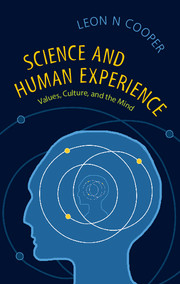Book contents
- Frontmatter
- Dedication
- Contents
- Preface
- Acknowledgement
- Part One Science and Society
- 1 Science and Human Experience: (Mephistopheles Is Alive and Well and Living in the Space Age)
- 2 Does Science Undermine our Values?
- 3 Can Science Serve Mankind?
- 4 Modern Science and Contemporary Discomfort: Metaphor and Reality
- 5 Faith and Science
- 6 Art and Science
- 7 Fraud in Science
- 8 Why Study Science? The Keys to the Cathedral
- 9 Is Evolution a Theory? A Modest Proposal
- 10 The Silence of the Second
- 11 Introduction to Copenhagen
- 12 The Unpaid Debt
- Part Two Thought and Consciousness
- Part Three On the Nature and Limits of Science
- References
2 - Does Science Undermine our Values?
from Part One - Science and Society
Published online by Cambridge University Press: 05 November 2014
- Frontmatter
- Dedication
- Contents
- Preface
- Acknowledgement
- Part One Science and Society
- 1 Science and Human Experience: (Mephistopheles Is Alive and Well and Living in the Space Age)
- 2 Does Science Undermine our Values?
- 3 Can Science Serve Mankind?
- 4 Modern Science and Contemporary Discomfort: Metaphor and Reality
- 5 Faith and Science
- 6 Art and Science
- 7 Fraud in Science
- 8 Why Study Science? The Keys to the Cathedral
- 9 Is Evolution a Theory? A Modest Proposal
- 10 The Silence of the Second
- 11 Introduction to Copenhagen
- 12 The Unpaid Debt
- Part Two Thought and Consciousness
- Part Three On the Nature and Limits of Science
- References
Summary
Is science compatible with our values, or is it opposed to them? Does science have a value system of its own, or is it value neutral? Why is the image of science as creator of Frankenstein monsters so persistent despite the many material benefits science has bestowed upon us?
This essay is based on a talk given in 1977 at Brown University that focused on the role of values in liberal education and was later published in the Brown Alumni Magazine.
1
In a world full of noise about the evils of science and technology, a world overflowing with PCBs, nuclear wastes, carcinogenic agents of every description, a world threatened with ozone depletion, recombinant DNA, to mention a few, I am asked to write on the role of values in what Theodore Roszak, a not too friendly critic, labeled “this strange intellectual passion we call science.” Presumably what is expected is something in the vein of the 1808 Elements of Natural Philosophy, where we are informed that: “The great object of science is to ameliorate the condition of man, by adding to the advantages which he naturally possesses.”
Call it wide-eyed innocence, but I believe most people are not taken in by much of the nonsense they are subjected to and, though confused and troubled, are too sensible to be swept along with seasonal intellectual fashion.
- Type
- Chapter
- Information
- Science and Human ExperienceValues, Culture, and the Mind, pp. 24 - 36Publisher: Cambridge University PressPrint publication year: 2014

